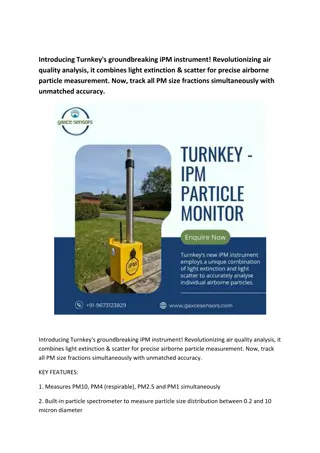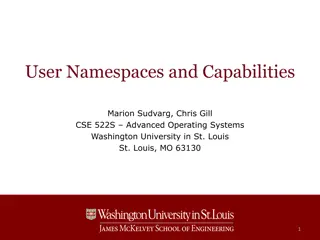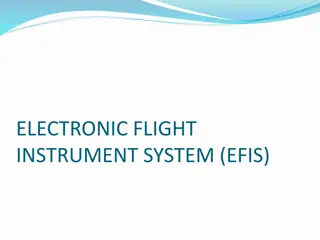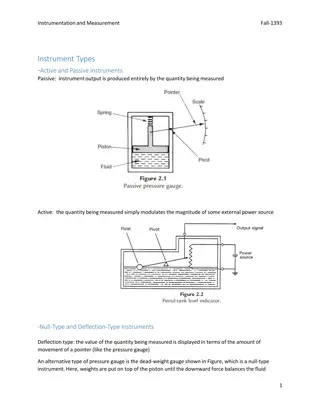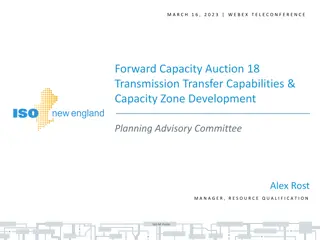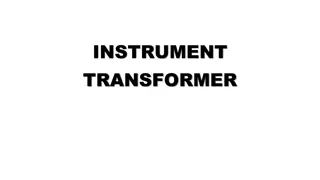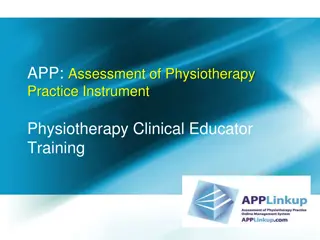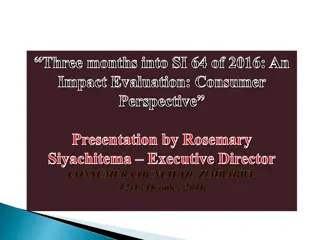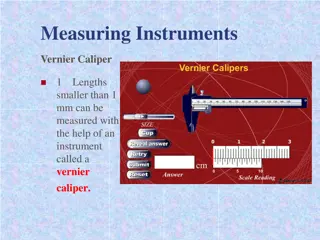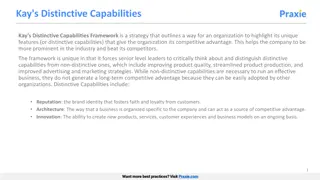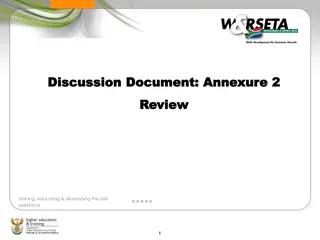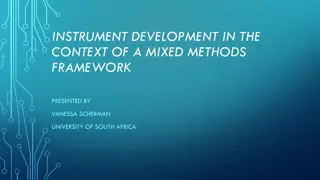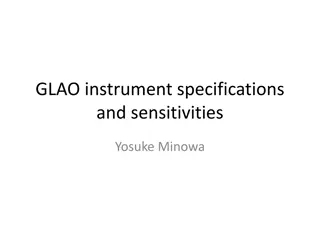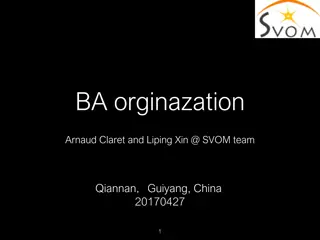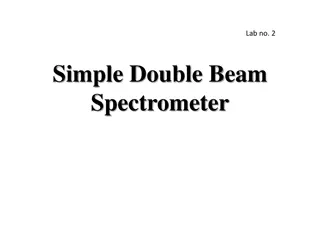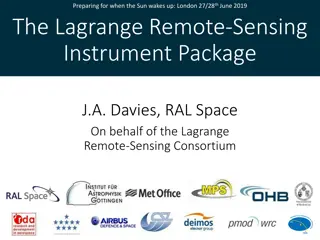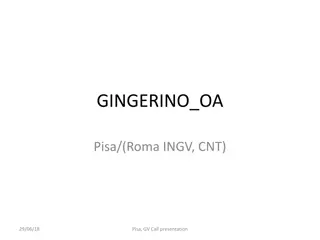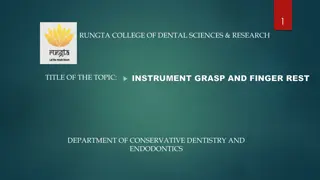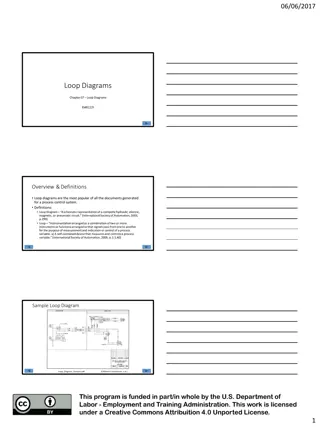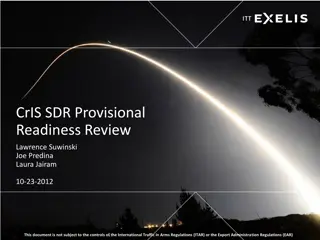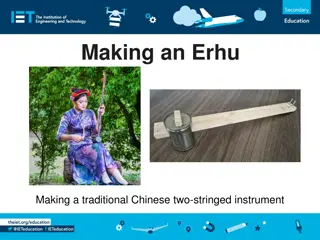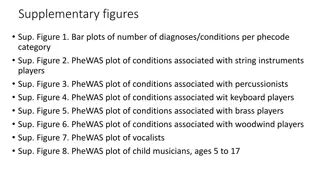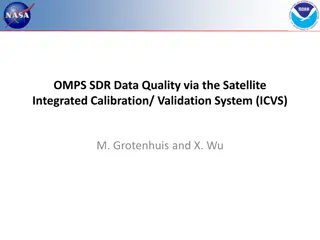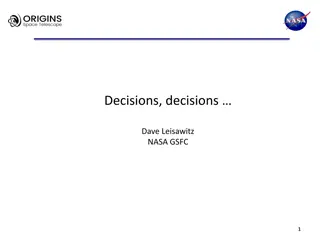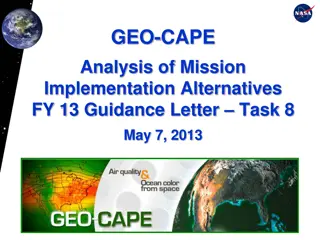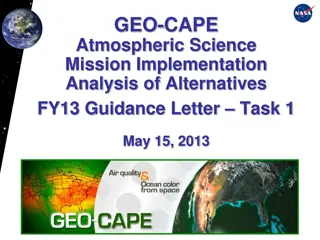Instrument human capital cybersecurity mkb bedrijven
This concise instrument helps small and medium-sized businesses in the Netherlands enhance their cybersecurity by leveraging human capital. It provides practical tips and guidance on organizing cybersecurity within the company, focusing on employees (internally) and professionals/suppliers/advisors
1 views • 59 slides
Understanding Women's Smoking Behavior: A Pilot Test of Readiness and Motivation Instrument
Conducted with 495 women smokers in public health clinics, the pilot test assessed readiness and motivation to change smoking behavior. Findings highlighted varying stages of readiness and motivation, with a focus on pregnancy enhancing the readiness to quit. The instrument designed accommodates low
2 views • 28 slides
Vi-CELL.BLU - Advanced Cell Counting Instrument
Vi-CELL.BLU is a cutting-edge cell counting instrument that offers faster analysis, increased resolution, and improved optical sensor technology for enhanced cell concentration and viability assessments. The device features a user-friendly interface, Trypan blue method for live cell detection, and a
1 views • 19 slides
Understanding Data Acquisition and Instrument Interface
In the realm of data acquisition and instrument interface, various components come together to sense physical variables, condition electrical signals, convert analog to digital data, and analyze the acquired information. This process involves transducers, signal analysis, instrument automation, and
3 views • 54 slides
European Spallation Source Neutron Instrument Project Overview
The European Spallation Source (ESS) Neutron Instrument Project aims to develop 15 world-leading neutron instruments by 2023. The project involves instrument classes, performance targets, budget considerations, and a planned schedule for instrument commencement. The NSS project scope includes reduci
4 views • 18 slides
Exploring Lunar Surface Radiation Risks and Mitigations Using Bioengineering
Lunar Explorer Instrument for space biology applications, LEIA Mission, addresses radiation health risks for crewed lunar exploration. The project aims to engineer yeast strains to study radiation sensitivity and identify genetic factors affecting cellular response. The instrument suite includes Bio
6 views • 8 slides
Introducing Turnkey's groundbreaking iPM instrument
\nIntroducing Turnkey's groundbreaking iPM instrument! Revolutionizing air quality analysis, it combines light extinction & scatter for precise airborne particle measurement. Now, track all PM size fractions simultaneously with unmatched accuracy. \nKEY FEATURES:\n1. Measures PM10, PM4 (respirable),
1 views • 2 slides
Understanding Linux User Capabilities and Namespace Management
Linux user namespaces and capabilities play a critical role in managing system security and permissions. Users and groups are assigned unique IDs, and processes are associated with the user's ID. The kernel enforces permission checks based on user IDs and group IDs, allowing root access to bypass ce
0 views • 14 slides
Minneapolis Preschool Screening Instrument-Revised Guide
This guide provides comprehensive information on the Minneapolis Preschool Screening Instrument-Revised (MPSI-R). Learn how to administer the tool, calculate chronological age, identify information, and score the MPSI-R accurately. The guide covers various languages served, scoring procedures, and s
1 views • 14 slides
Understanding Electronic Flight Instrument System (EFIS)
An Electronic Flight Instrument System (EFIS) replaces traditional flight deck instruments with electronic displays like the Primary Flight Display (PFD) and Multi-Function Display (MFD). EFIS enhances situational awareness for pilots by consolidating critical flight data in a single, easy-to-read i
0 views • 12 slides
Understanding Instruments in Instrumentation and Measurement
Passive and active instruments play key roles in measurement, with null-type and deflection-type instruments providing different ways to display values. Analogue and digital instruments offer varying outputs, while indicating instruments and those with signal outputs serve different purposes. Smart
2 views • 12 slides
Update on Forward Capacity Auction 18 Transmission Transfer Capabilities
This update covers the progress and developments surrounding the Forward Capacity Auction 18 (FCA 18) transmission transfer capabilities, Capacity Zone Development, and ongoing analyses in New England's power system. The ISO-NE has been actively reviewing interface transfer capabilities, discussing
1 views • 25 slides
Understanding Instrument Transformers in Electrical Systems
In electrical power systems, instrument transformers play a crucial role by stepping down high currents and voltages to levels suitable for measurement using instruments like current transformers (C.T.) and potential transformers (P.T.). These transformers offer numerous advantages such as independe
1 views • 29 slides
Assessment of Physiotherapy Practice Instrument Overview
This content provides an in-depth look at the Assessment of Physiotherapy Practice (APP) instrument used for evaluating student performance on clinical placements in Australian Physiotherapy Programs. It covers the development, components, and usage of the standardized instrument, along with its rol
0 views • 37 slides
Impact Evaluation of Statutory Instrument 64 of 2016 on Consumer Prices in Zimbabwe
Statutory Instrument 64 of 2016 in Zimbabwe regulates the importation of various products to promote local production. The legislation does not ban imports but requires licensing for bulk importers. The consumer prices of certain goods increased post-implementation, influenced by factors beyond SI 6
0 views • 14 slides
Understanding Vernier Caliper: Precise Measurement Instrument
Vernier caliper is a precise measuring instrument used for measurements smaller than 1 mm with an accuracy up to 0.01 cm. It consists of two pairs of jaws for measuring linear dimensions, external, and internal diameters. The steps to measure with a vernier caliper involve aligning the main scale an
0 views • 35 slides
Enhancing Competitive Advantage Through Distinctive Capabilities Framework
The Kay's Distinctive Capabilities Framework provides insight into how organizations can leverage unique features to gain a competitive edge. By identifying distinctive capabilities such as reputation, architecture, and innovation, businesses can set strategic objectives, distinguish non-essential c
2 views • 4 slides
Proposal for Improving Workplace Skills Survey Instrument
This document outlines the proposal for enhancing the data collection instrument and survey process for workplace skills development within the current SETA Grant Regulations. It addresses challenges in data quality, relevance, and accessibility, aiming to streamline the process and enhance skills p
0 views • 13 slides
Instrument Development in the Context of Mixed Methods Framework
Explore the intricacies of instrument development within a mixed methods framework as presented by Vanessa Scherman from the University of South Africa. The overview delves into mixed methods research, methodological norms, and closing the loop in research processes. Gain insights into the pragmatic
2 views • 40 slides
Overview of GLAO Instrument Specifications and Sensitivities
The content discusses the GLAO instrument specifications and sensitivities as presented by Yosuke Minowa. It covers simulated instruments as of 2013, including wide-field NIR imaging, BB imaging, NB imaging, MOS spectroscopy, and more. A new instrument plan for a multi-object fiber IFU spectrograph
1 views • 13 slides
Evolution of Orchestra: From Ancient Egypt to Modern Times
The evolution of orchestras dates back to ancient Egypt, with the Roman Empire showing disdain towards musicians. Instrument families emerged in the eleventh century, while the Middle Ages saw the grouping of specific instrument families. Modern orchestras began in the late sixteenth century, with s
0 views • 24 slides
Roles and Organization of the Burst Advocate Support Team in Astrophysics
This document outlines the structure and responsibilities of the Burst Advocate (BA) support team in the context of astrophysics research, focusing on roles such as Burst Advocate, Instrument Scientist, Instrument Expert, and Burst Advocate Assistant. The team's tasks include supervising data distri
1 views • 20 slides
Understanding the Simple Double Beam Spectrometer
The simple double beam spectrometer is a vital instrument used to measure the amount of light absorbed by a sample at a specific wavelength. This device utilizes two light paths originating from the same source - one for the sample and the other for the reference. By splitting light beams, utilizing
2 views • 17 slides
Lagrange Remote-Sensing Instrument Package Overview
The Lagrange Remote-Sensing Instrument Package comprises four instruments for monitoring solar activity, including the Photospheric Magnetic Field Imager (PMI) and Extreme-UltraViolet Imager (EUVI). Consortium members from six nations are involved in this initiative, aimed at enhancing space weather
0 views • 16 slides
Advanced Ring Laser Instrument - GINGERINO: Precision Earth Rotation Measurement
The GINGERINO project utilizes a groundbreaking ring laser instrument for precise measurement of Earth's rotation variations. It offers advantages in local measurements compared to space-based methods, aiding in geophysics and fundamental physics research. Operational since May 2017, GINGERINO boast
0 views • 27 slides
Understanding Instrument Grasps in Conservative Dentistry and Endodontics
This presentation focuses on the essential grasps and techniques used in Conservative Dentistry and Endodontics. It covers specific learning objectives related to anatomy, diagnosis, and cognitive skills required in the field. Detailed explanations are provided on various instrument grasps and finge
0 views • 25 slides
Overview of Loop Diagrams in Process Control Systems
Loop diagrams are essential documents in process control systems, providing schematic representations of hydraulic, electric, magnetic, or pneumatic circuits. They detail instrumentation arrangements, signal connections, power connections, and termination information. Guidelines and standards for cr
1 views • 5 slides
Exelis Engineering Support for CrIS Post-Launch Operations
Exelis played a key role in providing support for the CrIS satellite instrument post-launch operations. The support included activities such as early orbit instrument checkout, calibration table uploads, and developing new algorithms for better data processing. Exelis also assisted in updating Engin
0 views • 56 slides
Strategies for All Ages in Beginning Band
This presentation covers essential strategies for starting a school band program, including inventory management, instrument demonstrations, setting up an instrument petting zoo for students to explore, and teaching proper mouthpiece placement and embouchure techniques for brass instruments. The str
0 views • 10 slides
AOA Page 2: Instrument Care and Playing Positions Guide
This comprehensive guide provides step-by-step instructions on getting your instrument ready, assembling it properly, caring for it to ensure longevity, and adopting appropriate playing positions for optimal performance. From rest positions to chill positions, each detail is outlined with accompanyi
0 views • 91 slides
Understanding Holder in Due Course under Negotiable Instruments Act
The concept of Holder in Due Course (HDC) under the Negotiable Instruments Act is explained through Sections 9, 58, and 36. It discusses how a person becomes a lawful possessor of a negotiable instrument before maturity, in good faith and after due care. The implications of a holder taking an instru
0 views • 7 slides
Comparison of Radiometry and Instrument Measurements on Cruise Data
Analysis of radiometry closure among instruments and comparison of data collected on Monday and Wednesday cruises. Comments on data difficulty and uncertainties, as well as comparisons with dock measurements to assess instrument accuracy and agreement.
0 views • 14 slides
DIY Guide: Making an Erhu - A Traditional Chinese Instrument
Discover how to craft an Erhu, a distinctive Chinese two-stringed bowed instrument, with simple tools like a tin can, wood pieces, screws, a drill, and fishing line. Follow step-by-step instructions to create tuners, cut slots in the can, drill holes for strings and tuners, and assemble the componen
0 views • 12 slides
Analysis of Health Conditions Associated with Music Instrument Players
This analysis includes bar plots and PheWAS plots showcasing the number of diagnoses/conditions per Phecode category and conditions associated with various music instrument players such as string, percussionists, keyboard, brass, woodwind, vocalists, and child musicians aged 5 to 17. The plots revea
0 views • 9 slides
Understanding Instrument Air Quality Standards in Industrial Applications
TESCORP, based in Tulsa, Oklahoma, specializes in distributing, fabricating, and servicing compression systems globally. Instrument air quality standards are crucial for pneumatic instruments in various industries. ANSI/ISA 7.0.0.1996 sets the standard for instrument air quality, focusing on pressur
0 views • 17 slides
Monitoring Data Quality via Satellite Integrated Calibration/Validation System (ICVS)
Explore the OMPS ICVS, a system designed to monitor and evaluate the performance of OMPS and its SDR, aiding in anomaly investigation and resolution. The ICVS team collaborates to establish best practices for performance evaluation and visualization of instrument status. Discover how high-level inst
0 views • 13 slides
Workshop on Developing a National Instrument on Internal Displacement
This workshop aims to equip participants with the technical skills needed to develop a national instrument on internal displacement, focusing on prevention, protection, and durable solutions. Objectives include defining rationale, identifying instrument type, and planning a consultative process. Var
0 views • 7 slides
Key Decisions and Priorities for a NASA Mission Meeting
This document outlines the decisions to be made during a NASA mission meeting regarding science priorities, instrument capabilities, technology policy, and mission requirements. Key topics include revising priorities, addressing weaknesses in science cases, defining mission requirements, and coordin
0 views • 4 slides
Overview of GEO-CAPE Mission Implementation Analysis
The GEO-CAPE mission implementation analysis for FY 13 involved assessing instrument and mission risks, focusing on the impact of the TEMPO instrument on atmospheric science capabilities. Recommendations were made to update the instrument suite to align with evolving requirements. Risks were categor
0 views • 5 slides
Analysis of GEO-CAPE Atmospheric Science Mission Alternatives
The Geostationary Coastal and Air Pollution Events (GEO-CAPE) mission aims to measure atmospheric composition and ocean color. The impact of the Tropospheric Emissions Monitoring of Pollution (TEMPO) instrument on GEO-CAPE planning is acknowledged, with a need to adjust GEO-CAPE activities. An analy
0 views • 20 slides






